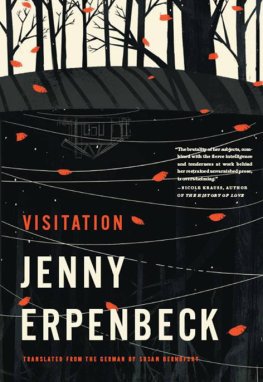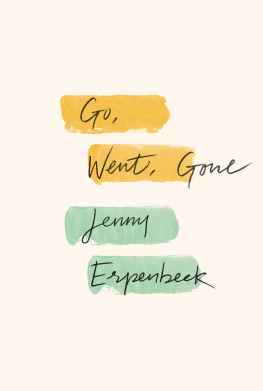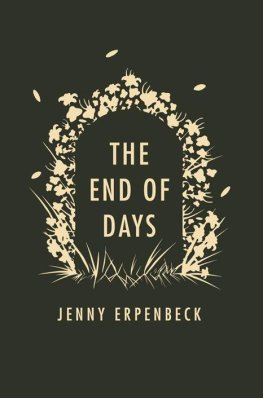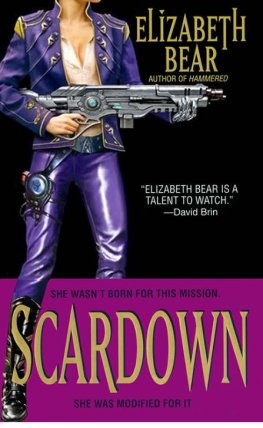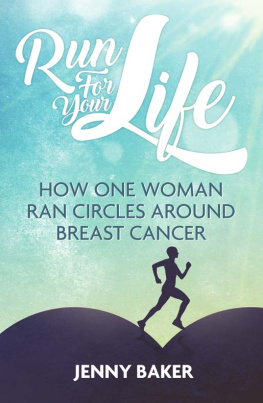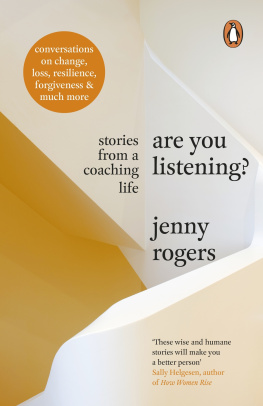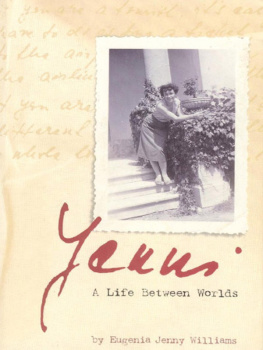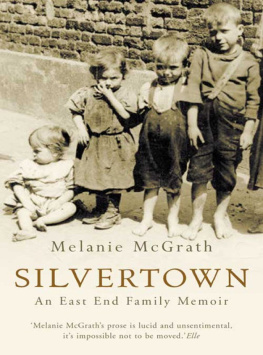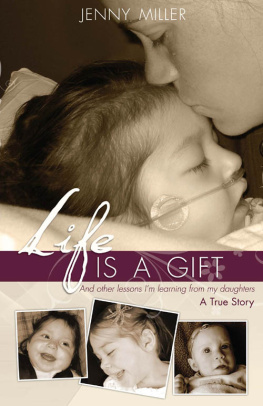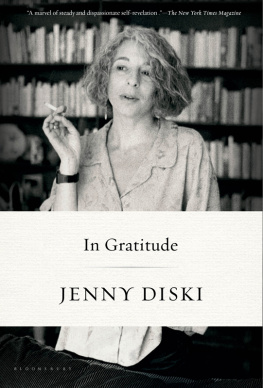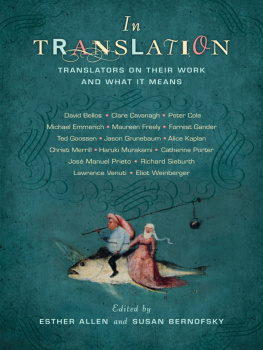NOT A NOVEL
Also by Jenny Erpenbeck
The Book of Words
The End of Days
Go, Went, Gone
The Old Child & Other Stories
Visitation
Copyright 2019 by Jenny Erpenbeck
Translation copyright 2020 by Kurt Beals
All rights reserved. Except for brief passages quoted in a newspaper, magazine, radio, television, or website review, no part of this book may be reproduced in any form or by any means, electronic or mechanical, including photocopying and recording, or by any information storage and retrieval system, without permission in writing from the Publisher.
The translation of this work was supported by a grant from the Goethe-Institut, which is funded by the German Ministry of Foreign Affairs.
Manufactured in the United States of America
First published as a New Directions Paperbook (ndp1484) in 2020
Library of Congress Cataloging-in-Publication Data
Names: Erpenbeck, Jenny, 1967- author. | Beals, Kurt, translator.
Title: Not a novel : a memoir in pieces / Jenny Erpenbeck ; translated from the German by Kurt Beals.
Other titles: Kein Roman. English
Description: New York : A New Directions Book, 2020. | Originally published in German as Kein Roman. Identifiers: LCCN 2020021691 | ISBN 9780811229326 (paperback ; acid-free paper) | ISBN 9780811229333 (ebook)
Subjects: LCSH: Erpenbeck, Jenny, 1967 | Authors, German21st centuryBiography.
Classification: LCC PT2665.R59 Z46 2020 | DDC 833/.92 [B]dc23
LC record available at https://lccn.loc.gov/2020021691
New Directions Books are published for James Laughlin
by New Directions Publishing Corporation
80 Eighth Avenue, New York 10011
For my father
Contents
- Preface
- LIFE
- At the Ends of the Earth
- Open Bookkeeping
- The Pressure Cooker
- John
- Homesick for Sadness
- Hope
- Time
- LITERATURE AND MUSIC
- Literary Role Models
- Suction and Suggestion
- In Another World
- My Favorite Fairy Tale: Clever Hans
- How I Write
- Among People
- On The Old Child
- On The Book Of Words
- Speech and Silence
- Becoming Myself
- Hans Fallada
- Will I Come to a Miserable End?: On Thomas Mann
- Ovids Metamorphoses
- Walter Kempowskis Novel All for Nothing
- SOCIETY
- How Are You? Good?
- Blind Spots
Preface
Many different eras are collected in this volume.
I remember one summer in a house in the countryside, a house that hasnt been our house for a long time now: I was sitting at the electric typewriter, writing a seminar paper on a fairly obscure topic, but one that had provoked me to intensive reflection and obsessive writing. I hadnt even chosen the topic myself, it was my professors suggestion. That was the first time that I experienced how someone else could open a door for me into my own reflections. I typed, looked out at the lake, typed some more. Whenever I wanted to change some part of the text, I would take scissors and cut it up into individual paragraphs, shuffle them around on the floor until the collage was just right, and then reach for the glue. A long-forgotten approach to writing, it was 1992, a time we now refer to as the last century. When my friends came to visit, they left me alone with my work in the morning, in the afternoon we would go for a swim together, cook, talk, lie in the sun. I was in my mid-twenties.
I bought my first computer in 1994 and used it to write my first book, The Old Child. When the book came out in 1999, I was living in Austria, working at the opera in Graz, Id only recently started directing my own productions. After the book was published and the first positive reviews appeared, I started getting requests for short stories. Id never written a short story. I said yes. Twelve pages seemed like a good length. The desk in my study was so high that I could sit on a bar stool and look straight out the window at an enormous mountain. I sat there between rehearsals and on the weekends and wrote, the vaulted ceiling above me was more than 400 years old, the window opened outward in the typical Renaissance style. My publisher and I collected the stories in a volume that appeared in 2001, my second book.
Now people were asking me if Id like to write about an East German word that had been forgotten, if perhaps Id like to write a travelogue, if Id like to write about what literary associations I had with the word suction. Yes, I would. Writing was a game in which I encountered myself. I moved back to Berlin. The time that I had for writing now was Monday through Friday from 10 a.m. to 1 p.m. the hours when the nanny took our son out for a walk. My husband worked in another city. I wrote The Book of Words, which appeared in 2004. The solicitations were starting to pile up; this or that journalist, editor, writer, or publisher wanted to know: Would I like to write about my favorite fairy tale? About my literary role models? About what motivates me to write? About my childhood? Or about what music means to me? Of course I would. These projects and ideas, conceived by other people, revealed stories that were waiting within me, brought memories to the surface that were entirely my own. My child was growing up, now my writing hours stretched from 9 a.m. to 3 p.m. unless I was working on a stage production. Could the kindergarten in Nuremberg find room for an extra child while I was in town for six weeks of rehearsals? I started writing my first longer novel, Visitation, which appeared in 2008. That was the same year that my mother died. I received a prize for the book and gave an acceptance speech. The date of the speech fell during my period of mourning.
I received another prize, then another. Often the prizes have names. Names of authors who are familiar, but sometimes other names that arent familiar. What does this or that author have to do with me? Have I ever read the authors works? I read the author again, or for the first time, I spend three weeks, four weeks, six weeks reading. Browse through my own library. Discover the self I used to be in my old notes and annotations. The genre of the acceptance speech offers a great deal of freedom, except in one respect: When you get the prize, you have to give the speech. Is there a new novel on the way? A friend asks me if Id like to write her a screenplay. Another friend asks if Id write a text to go with her photos. And do I like the Beatles? An author asks if Id like to participate in a series of events on the topic Living and Writing in the Age of Competitive Society. I load and unload the dishwasher, hang the laundry out to dry, bake cakes for my childs birthday. I wonder if the boxes from my mothers apartment will sit in our hallway forever, waiting to be unpacked.
In 2012, my novel The End of Days appears. The University of Bamberg invites me to give a series of lectures on poetics. How long is a lecture? 40 to 50 minutes, they say thats about 20 to 25 pages per lecture. There are supposed to be three lectures. At least half a year of work. Are you writing another novel yet? I go on reading tours to cities in Germany, and also abroad. I pack suitcases. Who will take care of the guinea pigs? What hotel am I staying in, anyway? Am I interested in the topic Landscapes of Childhood? Yes, very much so. I receive a prize, and another, and another. The prize money helps me get by. The namesake authors are interesting. I stand at my bookshelf pulling out this or that book, reading this or that passage. The date for the award ceremony is already set. Would I like to tell high school graduates in Saarland what I think is the most important thing in life? Thats a hard one. What


